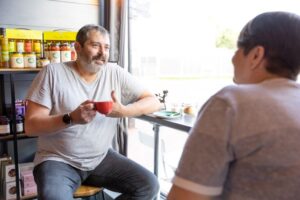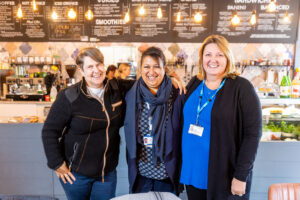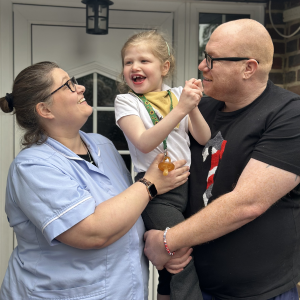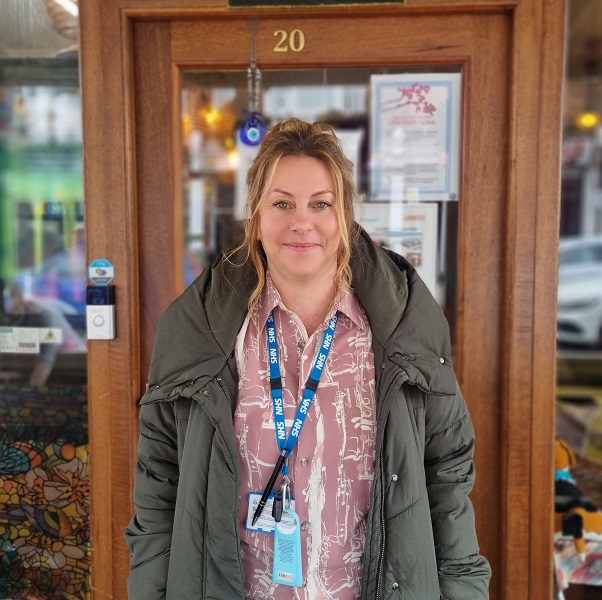Someone to turn to
For some people in crisis, they can feel like A&E is the only place for them when they just don’t know where else to turn. April Forshaw found out how an innovative service to support patients who make frequent calls is giving them the help they need, leaving 999 and A&E free for life-saving emergencies.
Battling alcoholism and chronic fatigue, Stuart Rimmington would end up in A&E or calling an ambulance weekly.
But now thanks to the Frequent Service User Team, he is four months sober and hasn’t attended A&E in months. Stuart, who has been supported by the team for the past three years, said: “I felt like I was going around and around in circles. I’d get myself into a downward spiral, often feeling suicidal. I’d call an ambulance or go to A&E for help, as I didn’t know who else to turn to, but I would get assessed and sent back home,” Stuart explained.
“I was then referred to the Frequent Service User Team and they actually listened to me. They wanted to talk to me and identify the deeper issues as to why I ended up in A&E. I finally had someone to turn to.”
Frequent Service User Manager Jill Whibley first trialled the service in west Kent in 2017.
She said: “Our first concern is always getting the people who need our help, the right help. A report from our commissioners showed a small group of people in west Kent were using our health services in a way that cost more than all our patients put together. That wasn’t their fault, these patients were falling through the cracks. They attended for multiple reasons and all needed different support. I knew there was more that could be done to help identify their concerns and find solutions that would help them long term and use the money we save to help other people who need us,” says Jill.
The service offers a robust way of supporting people who make frequent use of health services, in particular A&E, primary care and mental health services.
They can help patients practically and support their emotional health and wellbeing with things such as being at the end of the phone if they need to talk, stopping them from going into crisis, guiding them through complex personal problems, liaising with other services or talking to their family, GP and other healthcare professionals. They also have a specialist in the team to support under 18-year-olds and their parents.
“I speak to someone from the service at least once-a-week,” added Stuart. “I can now recognise when I am building up to an episode and they are always there at the other end of the phone. It’s nice to know you have someone there to encourage you when you feel this way. Not only are they there to talk to, but they link in with other health services I am receiving support from, like Change Grow Live Recovery Service, to make sure I am getting the right care, as well as signposting me to services I had never even heard of for support.”
Support worker Phillipa Brewer successfully applied for a national lottery grant, which they can use to take patients on days out to help with their social engagement.
Philippa said: “A lot of our patients live alone and some don’t leave the house for days. When they join the service, we find that a lot of them feel lonely and isolated. Our days out give them the opportunity to meet new people and interact with those in a similar position to them. Social engagement is a key part of their recovery.”
After getting help from the service for just one year, one group of 15 patients reduced their use of A&E and 999 services by 253 incidences, saving the NHS more than £100,000.
 The service also supports those who need help or advice with social worries, as Jan Foulds experienced first-hand.
The service also supports those who need help or advice with social worries, as Jan Foulds experienced first-hand.
Jan said: “My daughter had a stroke very young and I found myself in a position where I wanted to care for her at home, but my home was far too small and not equipped for my daughter’s wheelchair. I didn’t know who to turn to,” said Jan.
“I rang all the services I could think of and wasn’t getting anywhere before I was referred to the team. They honestly saved me, I don’t know what I would have done without them. They helped me get in contact with the right people and before I knew it I had my daughter back in her own home, which has been repaired and adapted thanks to the help from the service.”
Jan has kept in regular contact with the service for more than 18 months now and attends their days out.
She said: “I hardly get to leave the house due to my own health conditions and caring for my daughter. The days out provide me with some respite to meet new people. If it weren’t for them I wouldn’t leave the house,” she adds.
Jan said: “I consider those who work for the service my friends now. They genuinely care and are an amazing team which does incredible work.”
Patients who are referred to the service are not discharged. Once patients are on the case load of the Frequent Service User Team, they can contact the team when needed.
Jill added: “We aim to promote resilience and self-management, so people are not relying on services unnecessarily. We want patients to know we are always there for them on the other end of the phone or available to visit them at home.
“Some patients may never call us again, but knowing that we are there if they need us helps prevent them from calling their GP or attending A&E unnecessarily. This is not a short-term fix, we’re here for the long-term.”

Frequent Service User Team: Phillipa Brewer, Jill Whibley and Vanessa Savidge.
Share this article on social media





